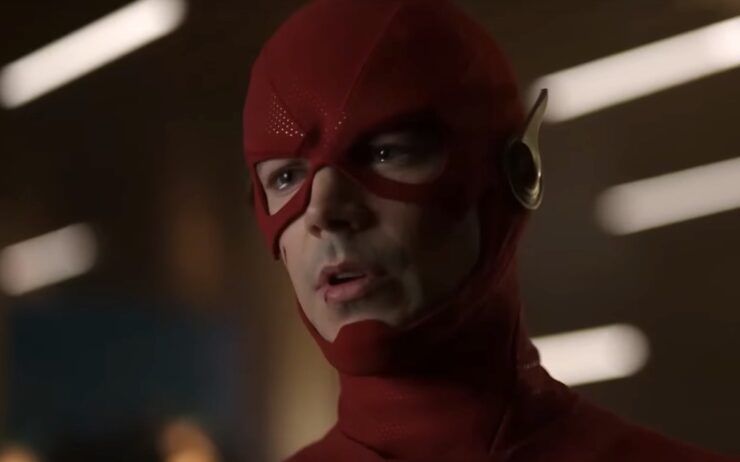The Flash began life as the first spin-off series from Arrow—but it ended as the last bastion of the Arrowverse. When we said goodbye to Barry Allen/The Flash (Grant Gustin) and Team Flash, we also bid adieu to an entire franchise. The Arrowverse lasted for a little over a decade, spawned five other television shows, two web series, and crossed over with almost every single DC Comics live-action property known to exist. The final season of The Flash carried the weight of concluding a decade-long love affair with the renaissance of superhero television. It was quite the burden, and unfortunately, “The Final Run” buckled under the pressure.
The final season of The Flash broke my heart. It wasn’t good; a couple of episodes shone through, as did several of the returning guest stars, but as a whole, “The Final Run” was a disjointed, incoherent mess. The showrunners chose to tell the story of the final, curtailed 13-episode season, as chapters, broken up with different storylines and villains.
To kick things off, the season began with the wonderful “Wednesday Ever After,” an episode about Barry and Iris West-Allen (Candice Patton) stuck in a time loop as they try to communicate what they want from their marriage and future. But then we segued into Team Flash Barry and a band of reformed Rogues fighting Red Death. Seeing Javicia Leslie back in the Arrowverse, albeit not as her heroic Ryan Wilder/Batwoman, but as a truly unhinged and evil doppelganger was cool. Oh, but wait, she’s defeated in four episodes, and Barry and Iris are off on holiday. No, they’re back, and something creepy is happening in S.T.A.R. Labs. There’s more creepiness with Nia Nal/Dreamer’s (Nicole Maines) latest dreams, and even more with Barry’s birthday, and then we’re in “A New World” following the resurrected Eddie Thawne (Rick Cosnett). I got whiplash watching this season.
The audience couldn’t get settled, and neither could the writing, so by the time the finale came along, the whole thing was a whirlwind of wrapping up “A New World,” squeezing in a climactic battle and concluding all the characters’ arcs. And then it was over. The finale was the nadir of the season–the effects were dodgy, the editing was rushed, and the battle between Team Flash and Eddie/Cobalt Blue and his team of supervillain speedsters was too easily won. All of Team Flash had levelled up but we never saw them gain their XP points during the season, so they all came across as deus ex machinas (except for Jon Cor’s Mark Blaine/Chillblaine who just stood about in the final battle). I don’t think it helped that Rick Cosnett was such an effective scene-stealer with his despair and anger in “A New World” that it made me wish we’d seen more of him this season. I was more emotional over the end of Arrow, and I’d long stopped enjoying that show. I’ve always welcomed The Flash into my home, and yet, the finale left me empty. “The Final Run” was an underwhelming send-off for the characters, and for the fans. But, really, should I have been surprised?
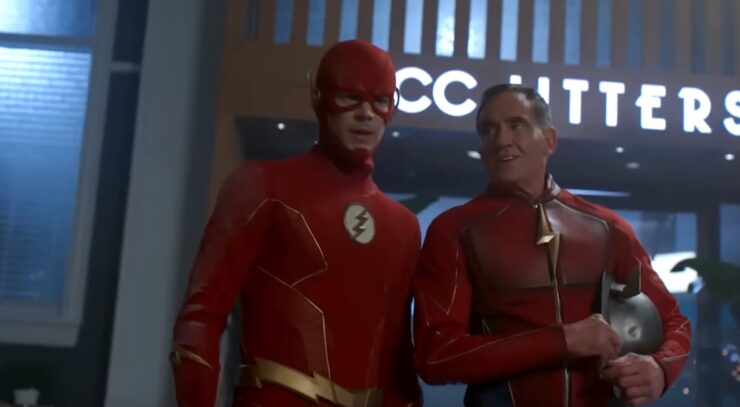
The Flash has always been enjoyable, but it stopped being cohesive quite a while ago. Season one remains its strongest (that in itself says a lot)—Barry was finding his feet as a hero and he was up against his greatest comic book nemesis, Eobard Thawne/Harrison Wells/Reverse-Flash, played with sinister charm by Tom Cavanagh. No other villain on the show has quite grasped the charisma and scene-stealing prowess of Cavanagh as OG-Wells. He kept coming back as a different Wells for several seasons, but none of those characters had the same appeal. Subsequent appearances of Eobard also didn’t capture the same intensity as the first season. Thawne and Barry’s battle was personal—Thawne had killed Barry’s mother and framed his father—and the show couldn’t quite find the same emotional heft with any of Barry’s subsequent villains.
Granted, the first season fell into the silly trope where all the men around Barry were told of his secret identity as the Flash, but the love of his life, Iris, had to be “protected” from this. Thankfully the show didn’t stick to that illogical idea for long, and a few seasons later Iris became co-leader to Team Flash.
The first several seasons had one main villain that the team had to defeat, as well as episodic baddies to break the monotony. This uniform storytelling really worked, and it’s what we needed in season nine. The show regularly dipped into the pool of the Flash’s rogues, sometimes even reaching into other DC stories, but always explored the vast canon of comics characters.
Teddy Sears was the second season’s villain. The showrunners cleverly introduced him as Jay Garrick, the original Flash from the comics before revealing his true identity as Hunter Zolomon, the supervillain known as Zoom. The twist was exhilarating. Sears was the right kind of kindly and charming who you could believe was a hero desperate to return to Earth-2, but he also convincingly played unhinged scary. In the comics, Zoom is the arch-nemesis of Kid Flash, but Wally West (Keiynan Lonsdale) didn’t make an appearance till partway through season two, and didn’t become a superhero till the following season. The lost opportunities with Wally are endless, but let’s get through a few more villains first.
I didn’t find Savitar (Tobin Bell) a very compelling villain—you don’t start off a season with “Flashpoint,” and then expect people to be invested in a CGI villain storyline that turns the leading lady into a damsel in distress. But the following season brought Clifford DeVoe/Thinker (Neil Sandilands) into the fray, and he upped the stakes. We finally had a villain who wasn’t a speedster, and he used his intelligence to outwit Team Flash at every turn. He was truly frightening.
After DeVoe, it was difficult to find the rest of the villains that interesting. It also didn’t help that from season five onwards, the show kept bringing Reverse-Flash back, as a villain, an ally, a deus ex machina—the embodiment of hate tamed by Barry who believes in love. Eobard, either played by Matt Letscher or Cavanagh, was like a bad rash who Team Flash could never get rid of, and one whom the showrunners didn’t want to get rid of. I don’t think it helps that the ominous Cicada, villain of season five and the person who was supposedly behind the Flash’s future disappearance, was played by an out-of-his-depth Chris Klein. I know Klein as a comedy actor, but he was surprisingly moving in the emotional scenes in The Flash. As a villain though… he really tried, but that was a poor casting choice.
After a series of white guy villains, The Flash gender-swapped Mirror Master, bringing in Efrat Dor to play Eva McCulloch as well as Sendhil Ramamurthy as the villain Bloodwork; I also love that August Heart/Godspeed was played by Karan Oberoi—how many genre properties have not one but two South Asian origin characters in prominent recurring roles even today?
The villains gave the story impetus, but The Flash bucked the trend of action heroes winning the day with a punch. He often appealed to the humanity of his rivals to save the day, which is the only reason Barry survived endless battles with Gorilla Grodd. Barry wasn’t always the strongest, but he believed in the best of everybody. Barry Allen being christened the Paragon of Love in the “Crisis on Infinite Earths” crossover event was signposted from season one.
It was hard to hate Barry on the show, especially since Grant Gustin was born to play the Flash. He captured the pathos of the character, but brought so much energy, positivity and heart to the character. He wasn’t a macho dude who thought he should fix his problems with a fight. Gustin’s performance was effortless throughout the nine seasons; he was compelling and emotive from the start. With a show like this, where the hero is fighting anything and everyone from a walking shark to his wife’s evil doppelganger, if the actors don’t commit, it’s a non-starter. Grant Gustin didn’t just commit; he was the Flash. This guy acted his heart out for all nine seasons.
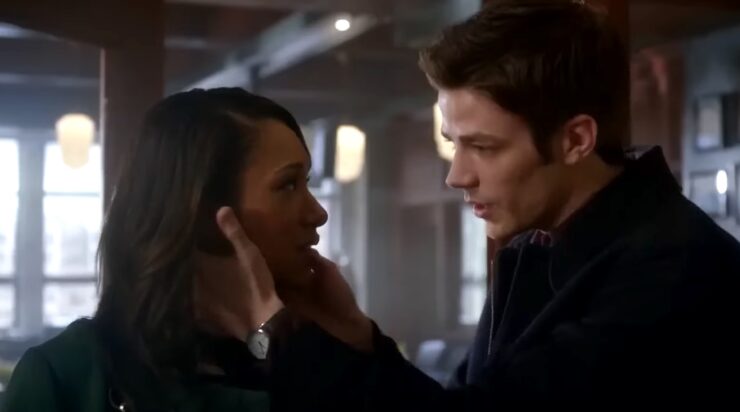
We’re getting used to our superhero landscape being more representative of the world we live in, but ten years ago, mainstream superhero fare was far behind in terms of diverse casting choices for on-screen, especially live-action, properties. But The Flash made a splash with Candice Patton’s casting. Iris West is a white woman in the comics, but the showrunners selected a Black actor to play the role. Patton has had little peace since, and the studio hasn’t protected her from the racist vitriol she’s had to face for a decade. Considering nothing about Iris’s race affects her characterization, in the comics or on the show, the hate towards her is unfathomable, but many Black women were unsurprised, because racism and misogynoir are something that Black women are made to contend with from all communities, including their own. Noticeably, despite the entire West family on the show being cast with Black actors (Jesse L. Martin as Iris’s father Joe West, and Keiynan Lonsdale as her brother Wally), Patton was the only one that came under constant fire. I don’t know how she stuck it out for nine seasons, but Patton persevered. And because of it, Iris is being portrayed as a Black woman across media—from the DC Extended Universe films, animation, and in some comic runs. She’s made a huge impact, and I credit her as the reason we got another incredible Black actor starring in a superhero show: Anna Diop on Titans. But will the cruelty towards Black actors, especially Black women, playing comic book characters initially conceived as white, ever end?
Patton was quietly effective as Barry’s “lightning rod.” I found her stolid determination fascinating; Iris is restrained and balanced, which is the opposite of Barry who is very open with his emotions. But we can’t escape the fact that Patton was never given the kind of material she deserved. I think the only time she got anything meaty to work on was during the latter part of season seven when the mirror version of Iris was being villainous. Patton disappeared for large parts of season eight—partly because she needed time off, but it meant Iris just wasn’t part of the story. She often didn’t feel like a leading lady at all. It doesn’t help that in the last four episodes of the show, Iris is relegated to being in labour in a hospital, while everyone else is being a hero. I hope Patton goes on to do greater things now that the show is over.
Where Iris West is, Wally West must soon follow. But if you got excited that Kid Flash was part of the show, you were set up for disappointment. The show never figured out how to handle more than one superhero, especially not another speedster, and Wally suffered for it. Lonsdale didn’t get enough screen time, had no character arcs, and was stuck with a romantic storyline that went nowhere. He exited the show after a little over two seasons. I think the writers tried to address how they failed Wally in the season nine episode “It’s My Party And I’ll Die If I Want To” when Wally confronts Barry about how Barry was living Wally’s life—he had two fathers, while Wally had nobody—and Barry thinks he’s the only one that matters. Barry doesn’t, but the writers sure seem to believe that. Lonsdale was such a joy to watch as Wally (especially when he appeared on DC’s Legends of Tomorrow), and I’m still gutted we didn’t get to see him as a second main character on the show.
Buy the Book
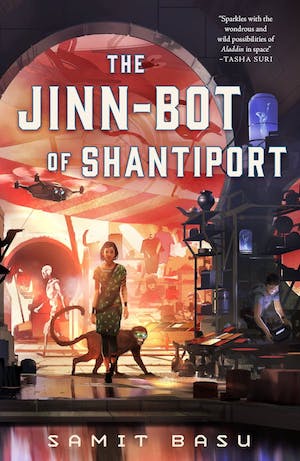

The Jinn Bot of Shantiport
And I think that’s where The Flash failed the most. The showrunners insisted on making Barry “The One Main Character.” Everyone else was simply set dressing. Carlos Valdes as Cisco Ramon is a massive favourite among fans because he was hilarious and honestly the best (except when it came to love interests, blame the writing in the early seasons), but he steadily had less and less to do on the show, and got less screen time. And then Valdes left and wasn’t even available for the final season. Danielle Panabaker is the only other actor to have as many on-screen appearances as Gustin and Patton, but she’s had an iffy run. The writers didn’t know what to do with a doctor character on a superhero team, so Panabaker’s character Caitlyn cycled through several romances in the first few seasons. Her characterization got so much better once the writers realized that her one true love was her late husband Ronnie Raymond (Robbie Amell) and the only love story she needed to explore was one of sisterly love with Frost. I am still at a loss why we ended up with Panabaker playing a new version of her character, Khione, in the final season, instead of her overcoming her grief for Frost.
The Flash wanted to be a team show, but it was named after a solo hero, so it was a constant tug-of-war over which way it would go. It was the team that usually got left behind. I’ve written about this elsewhere, but Team Flash spent a lot of time being sidelined on the show, especially in the last season. It’s beyond frustrating that the majority of characters who got the spotlight on the show were men, and this is particularly obvious in “The Final Run.”
We can’t not talk about the Ralph Dibny of it all. Ralph is Barry’s best friend in the comics—he was even his best man at Barry’s wedding. Ralph wasn’t introduced till the fourth season of the show and he quickly became part of Team Flash. He essentially took over the role of team funny man, the role that edged out Valdes’ Cisco. This was also the time when the show suddenly started fat-shaming people: Ralph on the show started off portly but shapeshifted himself to have a trimmer body, and somehow that made his, and the team’s, fat-shaming okay? The character was swiftly written off the show when actor Hartley Sawyer’s old tweets resurfaced, and Sawyer was subsequently fired. I can’t say I really missed Dibny, but a lot of folks had fallen in love with Natalie Dreyfuss’ Sue Dearbon, who marries Dibny in the comics, and Sawyer’s exit basically scuppered plans for Dreyfuss to have a larger role on the show. She had brief forays in season seven and eight, but it’s unfortunate the character faded away.
There was certainly a shift away from Barry carrying every single episode from season five onwards. Season five is my favourite, not because it’s the best but because The Flash introduced its best character in that period, Jessica Parker Kennedy’s Nora West-Allen/XS. I may be in the minority here, but I love Nora. Kennedy was a breath of fresh air, an injection of energy, a new life for the show. She was Team Flash’s first almost season-long female superhero, which was a much-needed change of pace (pun intended) on the show. Nora popped up in season four before her official introduction in “Nora”—I haven’t seen that kind of foreshadowing on other Arrowverse fare, so kudos to the showrunners and writers for pulling that off.
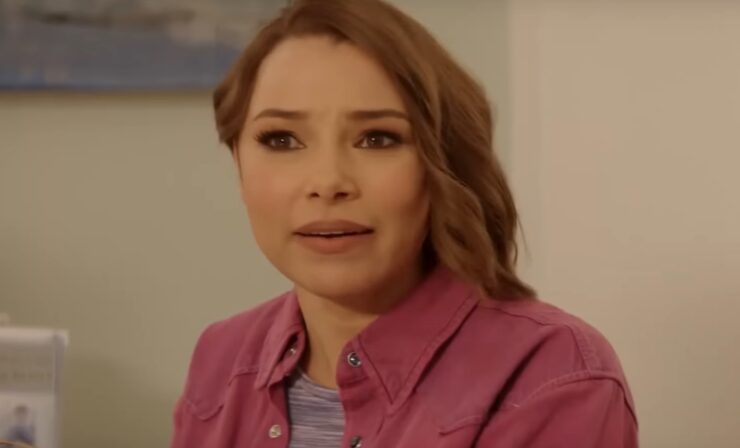
Adding Nora to Team Flash gave Gustin some time off, and it took the spotlight off the central white dude for a bit. Nora’s spotlight episode “Cause and XS” was one of the earliest times I noticed that Gustin was off-screen for most of an episode. It’s also one of the best (the best?) time-loop episodes in the franchise. They should have found a way to keep Nora on the show; she was erased from the timeline at the end of the season. The new Nora, sister of Bart Allen (Jordan Fisher) was less confident and played second fiddle to Bart. Like Cavanaugh in season one, Kennedy couldn’t capture the magic of her original run, but it was down to the characterization, not her performance. We got a glimmer of OG-Nora in season nine, though, so that was one positive in the final season.
The show isn’t as bad as its final season—I, and anyone interested in The Flash, can go back and rewatch the first five. “The Final Run” isn’t the show’s legacy. The Flash has made waves with its inclusivity, with its positive representations of masculinity through Barry, Eddie (pre-resurrection), and Joe West It raised the bar for performances in genre properties, and the show had gorgeous comic-accurate supersuits (Godseed’s suit, anyone?).
But I am frustrated that The Flash ended on such a low because this show means so much to so many people. The Flash got made because people loved Gustin when he appeared in a two-episode backdoor pilot on Arrow. It was part of the rise of superhero TV and it expanded representation at a time when mainstream superhero properties, like Smallville and the Marvel franchise, didn’t try all that hard. The Flash was campy, silly, funny, while also exploring raw grief and loss. This show effectively created the Arrowverse and gave us characters like Martin Stein/Firestorm (Victor Garber), Leonard Snart/Captain Cold (Wentworth Miller), Mick Rory/Heatwave (Dominic Purcell), all three of whom formed a core part of the original Legends of Tomorrow. We invested nine years in The Flash, and we had fun for a lot of it. Us viewers deserved better with the final season. The characters deserved better. The people making the show, behind the scenes or not, deserved better. In the words of Nora West-Allen, the last season should have been shway. It wasn’t, and now I wish I could put some The Flash-physics to the test and turn back time to fall in love with The Flash again.
Monita Mohan champions diversity, inclusivity, and representation through her writing at Collider.com, Women Write About Comics, HuffPost, Bam Smack Pow, and Show Snob.










